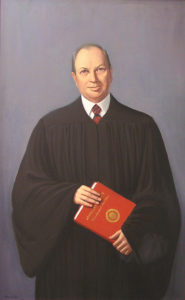Joe W. Sanders
Joe W. Sanders served as the chief justice of the Louisiana Supreme Court from 1973 to 1978.

Courtesy of The Law Library of Louisiana
Joe W. Sanders. Unidentified
Joe W. Sanders was the seventeenth chief justice of the Louisiana Supreme Court, serving in that capacity from March 14, 1973, to December 31, 1978. He was elected associate justice of the Supreme Court in 1960 to replace Justice Amos Lee Ponder, who had died in office. In 1964, Sanders was reelected to a full fourteen-year term. He became chief justice in 1973, ending a rapid succession of three chief justices in three years. After a highly publicized dispute with Governor Edwin Edwards over the outcome of a libel case, Sanders decided not to run for reelection and announced his early retirement in March 1978.
Sanders was born on May 31, 1915, in Pleasant Hill, Louisiana, to Oliver L. and Ozie Allen Sanders, and grew up on his family’s farm in Sabine Parish. He graduated from Louisiana State University with a bachelor of arts degree in 1935 and a bachelor of laws degree in 1938. As a young man, his leadership qualities were apparent: he was chosen to be student body president of Louisiana State University for the 1937–38 school year. He practiced law in Many, Louisiana, and was elected state representative in 1940 at the age of twenty-four. Sanders enlisted in the army in 1942 and served in Europe as a member of the Judge Advocate General’s Corps in Paris, attaining the rank of captain before his discharge in 1946. After the war, he established his law practice in Baton Rouge. In 1954, Governor Robert F. Kennon appointed him judge of the family court for the Parish of East Baton Rouge, a newly established juvenile and domestic relations court. His service at the family court won national attention.
In his retirement, he remained active as a visiting professor at the law schools of Louisiana State University and Southern University. He also served as chairman of the Louisiana Board of Ethics for Elected Officials and the Governor’s Commission on Criminal Justice. Sanders was involved in several organizations and committees that studied juvenile justice and family issues. In 1976, he received the New Orleans Metropolitan Crime Commission Award “for extraordinary service to law enforcement and criminal justice,” and he was awarded the honorary doctorate of laws from the William Mitchell College of Law in St. Paul, Minnesota, in 1978.
“One of the surest tests of the civilization of a country is the condition of its courts,” Sanders told the Louisiana legislature in 1978. “Our system of justice is never finished. It must be conditioned and improved in each generation.” As chief justice, he worked diligently to solve the burgeoning caseload problem at all levels of the judicial system through recommended legislation and improved court rules and procedures. He was instrumental in the establishment of the Louisiana Judicial College, which is charged with providing training and continuing education for judicial personnel, and the Judicial Planning Committee for long-range planning. Sanders established a Committee on Court Records Maintenance and Storage, implemented new technology in the court system, and improved communication with the legislature through the institution of a “State of the Judiciary Address” each year. Another notable achievement under Sanders’ leadership was the adoption of a modern Code of Judicial Conduct. At his retirement ceremony, Sanders offered his perspective of the judiciary as “an essential service to the people of our state … a pressure relief valve for many of the problems troubling our society.”
Sanders married Marie Sistrunk in 1940. He died on June 8, 1994, in Baton Rouge and was buried there in Roselawn Memorial Park.
